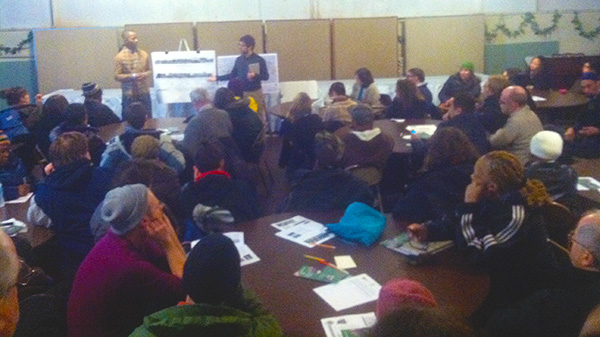
About 150 people turned out at the People’s Baptist Church at 5039 Baltimore Ave. for a public meeting about the future of the 5000 and 5100 blocks of Baltimore Ave. Business owner and state representative candidate Algernong Allen (front left) and David Hincher (right), both of Cedar Park Neighbors, facilitated the meeting, which raised as many questions as it answered. (Photo by Mike Lyons/West Philly Local)
UPDATED (2/1/14): City Paper’s Ryan Briggs also has a recap of Thursday night’s meeting at the People’s Baptist Church. He also caught up with Councilwoman Jannie Blackwell after the meeting to ask why she was missing and what’s happening with the land around 50th/51st and Baltimore. Read more here.
If one thing is clear following last night’s public meeting on the future of the 5000 and 5100 blocks of Baltimore Avenue, it’s that nothing is clear about the future of the 5000 and 5100 blocks of Baltimore Avenue.
About 150 people jammed into the basement of the People’s Baptist Church, to talk about what kind of development, if any, might take place in the area. The block is a patchwork of city and privately held land. Some parcels have structures – many are abandoned – and some are empty lots.
One longstanding plan by a private developer would expand the Mercy Wellness Center at 5008 Baltimore and include parking lots. Another plan by a private developer would have put a garden center on the block, but investors were scared off by the possibility of eminent domain seizures by the city.
Much of the background was included in a story last week.
Anxiety about the future of the area among nearby residents and property holders prompted the meeting. The meeting was well-intentioned, but some key players – like folks from the Philadelphia Redevelopment Authority, Councilwoman Jannie Blackwell and others – were missing, so many questions and concerns went unaddressed. People were looking for answers about blight certification, eminent domain and definite plans for the block. We don’t purport to have all of the answers in this post. We do try to fill in some holes by providing information (if you know more about this than we do, which is quite possible, comment below and we’ll try to fill holes together). For those of you have been keeping a close eye on this there will likely be nothing new here:
• Blight certification. The Philadelphia Redevelopment Authority oversees blight certification in the city. The ins and outs of that process are spelled out (somewhat) here. Blight and redevelopment reports are here. The area near 51st and Baltimore was certified for redevelopment in 1995, so the report is not online. The area is now due for recertification, which could pave the way for redevelopment. Certification clears the way for lots of things, including condemnation or seizure through eminent domain.
• Redevelopment plan. Before the city proceeds with redevelopment, it must have a plan. In the Philadelphia 2035 plan, the City Planning Commission identified 51st and Baltimore as an area where blight certification needed to be updated and a new plan written. It also notes that “senior housing” had been identified as a possible priority. The key here is that there needs to be a legitimate, specific plan in place with “demonstrated financing.” One plan that has been on the table for many years is the expansion of the Mercy Wellness Center, but no action has been taken.
• Eminent domain. Several speakers at last night’s meeting voiced concerns about the threat of eminent domain seizure as part of a redevelopment process chasing away potential investors. This requires a City Council resolution.
So that’s about the size of it. More questions were probably raised than answered last night. Perhaps the best thing we can do is serve as a public discussion platform. If you have comments, insights or answers, please feel free to comment below.
– Mike Lyons





February 4th, 2014 at 1:33 pm
Please note that the Philadelphia Redevelopment Authority
(PRA) has no plans to condemn any properties in either the 5000 or 5100 blocks of Baltimore Avenue, and many of the properties would in fact be ineligible for condemnation under current law. Although the Baltimore Avenue Redevelopment Corp. (BARC) shared conceptual plans with PRA in spring of 2013, PRA has not had any substantive conversations with any property owner, including BARC, about any current plan that would require condemning property. That one
property owner in the area has development ideas should not dissuade any other property owner from using or improving his or her property.
Over the past few weeks the PRA has tried to make clear that
it has no plans in the area of 51st and Baltimore. It declined the invitation to attend last Thursday’s community meeting because it felt that its presence would suggest that it is actively engaged in some development plan(s), which it is not. It also noted to two area residents who were likely to attend Thursday’s meeting, in writing and in advance of the meeting, that PRA had no plans in the area and had no plans to condemn any properties in the area.
PRA regrets that no reporter who has written about this issue to date has contacted PRA to determine what is or is not happening in this area. Had that occurred, perhaps some concern in the community could have been allayed.
Paul Chrystie, spokesperson
Philadelphia Redevelopment Authority
February 4th, 2014 at 8:42 pm
Since your department bizarrely sought to clarify the situation by blowing off the community meeting entirely, could you please explain why the PRA is looking to recertify the parcels as blighted if not to pave the way for future imminent domain? I cannot think of a single reason to go through with the blight certification other than imminent domain. This is the kind of question we would have asked had someone from the PRA attended. I look forward to the PRA’s response in this public forum. Thanks.
February 4th, 2014 at 10:23 pm
*eminent
February 6th, 2014 at 11:21 am
The law governing condemnations in Philadelphia changed effective 12/31/12. Under this new law, PRA must “declare” an area blighted – which requires the area to meet very strict criteria – and the Planning
Commission must certify the area as blighted for the large-scale condemnations discussed at recent neighborhood meetings to take place. PRA has no plans to declare the area as blighted, and in any event, the area does not even meet the strict new definition of blight.
That said, PRA may seek to acquire individual properties.For example, the vacant land at the southwest corner of 51st and Baltimore is mostly publicly owned, but a few privately owned vacant parcels remain. If the PRA were to seek to acquire those properties to support redevelopment of the corner, a Planning Commission blight certification would need to be in place. PRA could then declare an individual property or two as blighted so that acquisition of those properties could take place. Note that individual properties must also meet a very strict new definition of blighted. Properties that are up to date on their taxes and that have no L&I violations will not meet that definition.
This information was provided to meeting organizers and an attendee prior to the meeting. In declining the invitation to the meeting, a PRA project manager e-mailed the Baltimore Avenue Business Association on
January 14: “[Neither] I nor a representative will be in attendance at the meeting, as the PRA has no active initiatives in that area, and PRA attendance at the meeting may suggest the opposite. However, due to
the City Paper’s article suggesting that PRA is pursuing an initiative in the 51st and Baltimore area, the PRA would like to send a letter clarifying, and if possible, either yourself or a representative of the
Baltimore Avenue Business Association could read the letter at the meeting to ensure that the attendees understand that the PRA is not pursuing a condemnation on behalf of BARC.” (Emphasis added.) The BABA did not respond to the PRA request to provide a letter for the meeting.
In a January 16 e-mail to Mr. Spak, the PRA wrote: “The
short answer to all of your questions is that we have not been in any recent conversations with BARC about any proposal or redevelopment plan. Because of changes in condemnation law, nothing that happened prior to December 31, 2012, is relevant. If PRA were to try to condemn any properties to support BARC’s proposal(s), it would have to start from scratch under very different guidelines than those under which previous developments were advanced. While BARC has presented plans for the 5000 and 5100 blocks of Baltimore Avenue to the Planning Commission, we have not seen any evidence of financing for those plans. Of the two blocks, development on the 5100 block is more realistic because most of the parcels in the area considered for development are in public ownership. To develop the 5000 block using eminent domain would be
very difficult because of the changes in condemnation law, and that an adjacent property owner such as BARC has development ideas should not dissuade any
property owner in the 5000 block from using or improving his or her property.”
So to sum up, PRA will not be declaring the area blighted, which means that significant condemnations cannot take place. The Planning Commission will leave the certification of blight in place so that if acquisition of an individual parcel or two is necessary to assemble a parcel for redevelopment, and if that individual parcel meets the very strict new definition of blight, PRA can declare that property blighted and pursue acquisition.
Paul Chrystie, spokesperson
Philadelphia Redevelopment Authority
February 6th, 2014 at 11:26 am
In the above post, “(Emphasis added)” was supposed to refer to “the PRA is not pursuing a condemnation on behalf of BARC” which was bolded in the draft version, but the bold did not carry over to the posted version. Apologies for any confusion.
P. Chrystie
February 7th, 2014 at 10:48 pm
This would be funny if it weren’t so sad – Ryan Spak actually read part of that email off of his phone at the meeting while we were all trying to muddle through in the PRA’s absence.
The Philadelphia City Planning Commission staff who did attend to “observe” seemed to think that the parcels’ existing blight certification exempted them from the new, more restrictive eminent domain laws. If this is not accurate, it would have been helpful for PRA to have been there to correct them.